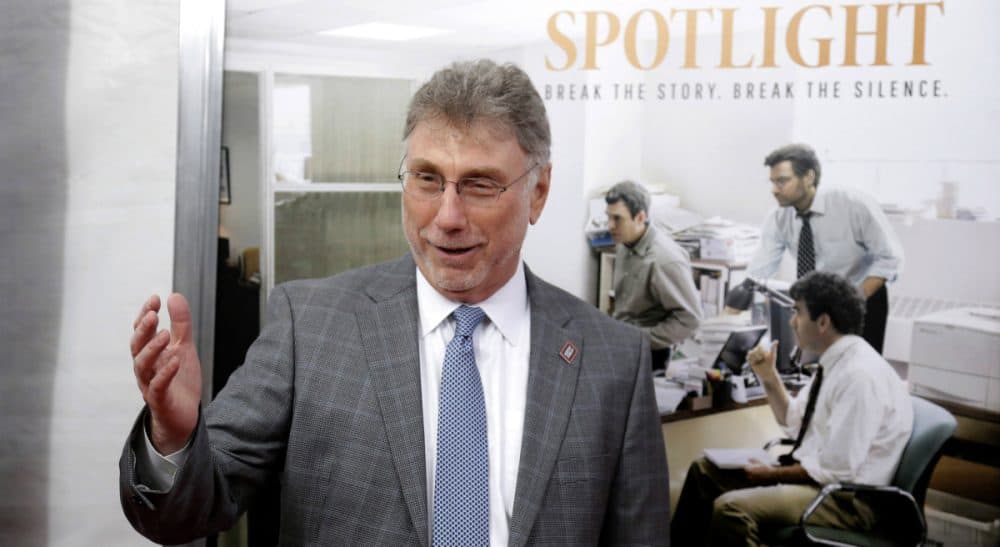Advertisement
In Film About Breaking The Clergy Sex Abuse Scandal, A Spotlight On Deference

“Spotlight,” the movie about The Boston Globe’s investigation into a church cover-up of child sexual abuse by Catholic priests, opens in limited release nationwide Friday, including in Boston. It may well be, as a headline in Variety declared, that it's “the film that will make journalism look good again.” That would certainly be a bonus for the nation’s beleaguered news business.
Still, questions remain about whether even such a taut, well-acted, realistic drama about a newspaper exposé from 2002 will draw movie-goers who today are far more likely to tap their news from a cellphone than to read it on the printed page of “Spotlight’s” world. The movie’s most unbelievable element, in fact, may also be its simplest truth: that then-Globe editor Martin Baron, played by Liev Schreiber, sparked such a profoundly powerful reporting effort on his very first day at the Globe, after being hired away from The Miami Herald.
Likely to give it additional appeal, though, is “Spotlight’s” broader, less-heralded angle: a warning about the dangers of uncritically deferring to authority. As Josh Singer, who co-wrote the screenplay with the movie’s director, Tom McCarthy, told me, “The theme of the film is really deference. It’s what makes this story universal.” Indeed, “It’s the same story as with Penn State and with Bill Cosby,” he added, pointing to the difficulties many people have had believing the sexual abuse accusations in those cases.
“Spotlight” is framed to highlight the Globe staff’s own shocking epiphany, as reporters overcame a deferential mindset when they began to penetrate the defenses thrown up by the entrenched Catholic hierarchy. “It’s about not wanting to stick one’s neck out to stop a problem,” Singer said, especially when that problem involves what are generally seen as “good institutions.” He asked, “Who really wants to bring them down?”
Marty Baron sees “Spotlight’s” message as extending far beyond the church scandal and the role of the press. Baron, now The Washington Post’s executive editor, noted in a recent email exchange with me that people in general — not just journalists in search of a good story — often balk at learning too much about organizations with generally favorable reputations. “Many charitable nonprofits, from arts institutions to those with a social purpose, get a pass on close examinations because they are seen as doing good. And many do good, but that shouldn’t exempt them from accountability,” according to Baron.
“The theme of the film is really deference. It's what makes this story universal."
Josh Singer, 'Spotlight' co-screenwriter
Yet journalists have a special challenge in breaking through the deference that surrounds such organizations and celebrities. “One reason institutions can escape examination is because they are sources for reporters,” Baron wrote. “That’s often the case with prosecutors, police and firefighters, who over the years escaped the more critical attention that their enormous power calls for. That deference has already begun to erode, as evidenced by a lot of reporting over the last couple of years.”
When it comes to sports teams and individual athletes, there, too, “beat reporters’ success depends on access, and investigations can put that access in jeopardy.”
In a way, the Spotlight team's “player-coach” Walter V. “Robby” Robinson, captured perfectly on-screen by Michael Keaton, serves as a proxy for the “everyman” at whom director McCarthy and screenwriter Singer aim their movie. As the paper’s pursuit of the story starts, Robinson (who describes himself as “a collapsed Catholic”) has a hard time believing that allegations of such widespread abuse by priests can be true. That changes when the team's reporting bears fruit, and Robinson sees the extensive, graphic documentary evidence hidden from public view by the church — until the Globe wins its legal battle to unseal it.
For Baron, developing the Globe’s church story fit with his long-held conviction that news organizations are often so close to certain topics that they can’t see what’s really happening. Dating to his years at The Los Angeles Times from 1979 to 1996, Baron has made note of stories that escaped coverage because reporters didn’t step back to look at the big picture.
He notes one area in particular: emerging financial crises. When he edited the LA Times’ Orange County edition, he told me, the paper didn’t see the county’s 1994 bankruptcy coming, even though “one reputable individual cautioned us that things were not as rosy as they appeared.” The paper “took a stab at it,” according to Baron. “But we didn’t dig nearly hard enough, and so we missed the catastrophic shenanigans in the county treasurer’s department [that] in the long run led to what was then the largest municipal bankruptcy in U.S. history. I took a lesson from that, constantly worrying that I’d miss a big story under my nose.”
For its part, the Globe’s Spotlight team still tackles stories that others may not pursue because of the deference accruing to the investigation target. Most recently: “Clash in the Name of Care,” a critical study of surgical practices involving the specialists at one of Boston’s most revered medical centers, Massachusetts General Hospital.
For moviegoers, the tale of dedicated reporters breaking the story of a lifetime will likely be the film's biggest draw. But if "Spotlight" leaves viewers with something to think about going forward, let's hope that it's a more critical understanding of how we view authority figures in general — and that the journalists who monitor them have the duty to help keep them honest.

